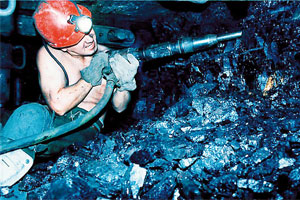The most common definition of energy has to do with physics and it is the capability to produce an effect or job. However, this issue will discuss energy from the economic and technological point of view. Meaning, what man uses as a necessary natural resource for his survival and does so by exploiting it and transforming it for different ends (domestic, industrial, etc.).
This energy we refer to is classified into renewable and non-renewable. The first ones are the inextinguishable energy resources, freely available, that are spread throughout ample areas and have low environment impact. Among renewable energies we find hydro, solar, eolic, geothermal, sea and biomass energies. The second group are those that exist in a limited supply and once employed completely cannot be replaced. They are oil, natural gas, coal and nuclear energy.
Man and energy sources
Besides the sun, Man used lumber (today called biomass) as a main source of energy during a great part of ancient history. This way, they took advantage of this resource, that was delivered easily and naturally by the forests that grew around them, for heating, cooking, manufacturing utensils, etc.
However, in the Middle Ages there was a breakthrough, because the vegetal resource started to be used for making coal. Its high demand caused a decrease in the amount of lumber (and native forests) available, due to this, in the beginning of the Industrial Revolution (1880-1914), vegetable coal was replaced with mineral coal (stone), known as coke. This is how this type of fuel began to be used for propelling steam-powered machines, becoming the dominant energy source as the Industrial Revolution went on.
A the end on the XIX century, the first oil well drillings began in the United States, which until then had only been used in medicine or construction.
The American oil industry grew so fast that refineries began to run that processed oil derivatives.
This made oil companies from other countries (such as Great Britain, the Low Countries and France) begin to look for crude oil in other parts of the world, especially the Middle East.
In the seventies, there were two great oil crises, due to the war between Arabs and Israelis, which made oil-producing countries cutback on their deliveries. In 1980, the war between Iran and Iraq generated a new increase in crude oil prices.
Today, oil and coal are still the energy resources that are used the most in producing energy and fuels. But dependence on oil is causing it to be consumed rapidly, reason for which new strategies have been looked at, such as solar, eolic, and geothermal energies, among others.
Resources and their energies
Currently, some natural resources (energetic) are processed and transformed for the generation of energy, especially electric. The most used are:
– Sun: it reaches Earth in the form of electromagnetic radiation and its energy (solar) is used directly or indirectly to produce heat and electricity.
– Wind: it is the motion of air in the atmosphere and it originates due to local differences in atmospheric pressure and the Earth’s rotation. This resource produces the so-called eolic energy, which is used to produce movement that generates force to move something, for example mills or turbines from aerogenerators that produce electricity.
– Water: it is an indispensable resource for the survival of living beings and can be used by transforming its potential energy (stored in reservoirs) into kinetic energy (dropped and passed through turbines) to then become electricity.
– Fossil fuels: coal, oil and natural gas are dubbed fossil fuels because they come from the remains of living beings that were buried millions of years ago, which under the right conditions of pressure and temperature turned into organic residues that can be used as fuels. They are employed directly, burning them to produce heat or movement in the case of cars or they can be used to obtain electric energy.
– Uranium: it is a chemical element that can be extracted from the Earth and is capable of producing energy through nuclear fission. This is what we know as nuclear energy.








